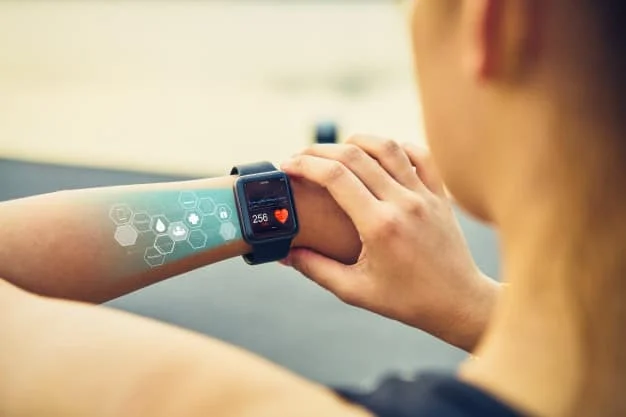Wearable Health Tech: How Smart Devices Are Transforming Personal Healthcare
The integration of wearable health technology has revolutionized personal healthcare, allowing individuals to monitor their health and fitness levels in real time. These smart devices, such as fitness trackers and smartwatches, are equipped with sensors to track various health metrics, including heart rate, sleep patterns, and physical activity. As a result, users can gain valuable insights into their overall well-being and make informed decisions about their lifestyle and health habits. Additionally, wearable health tech has the potential to facilitate early detection of health issues and promote proactive management of chronic conditions, ultimately leading to improved health outcomes and quality of life.
1. The Rise of Wearable Health Tech
Wearable health technology, also known as wearables, refers to electronic devices that are worn as accessories or implanted in the body to monitor and track personal health and fitness-related data. These devices can range from smartwatches and fitness trackers to more advanced medical devices such as continuous glucose monitors and ECG monitors. The popularity of wearable health tech has been rapidly increasing as people become more health-conscious and seek ways to take control of their own well-being.
These devices are equipped with sensors and software that collect data on various health metrics such as heart rate, sleep patterns, physical activity, and even environmental factors like air quality. The data collected by wearables can provide valuable insights into an individual’s health and lifestyle, enabling them to make informed decisions about their wellness. With the advancements in technology, wearables are now capable of providing real-time feedback and personalized recommendations to help users achieve their health goals.
2. Impact on Personal Healthcare
The integration of wearable health tech into personal healthcare has revolutionized the way individuals monitor and manage their health. These devices empower users to track their fitness levels, set achievable goals, and monitor their progress over time. For individuals with chronic conditions, such as diabetes or heart disease, wearables can provide continuous monitoring and early detection of any irregularities, allowing for timely intervention and improved management of the condition.
Furthermore, the data collected by wearables can be shared with healthcare professionals, enabling them to have a more comprehensive view of a patient’s health outside of the clinical setting. This can lead to more personalized and effective treatment plans, as well as proactive interventions to prevent potential health issues. Wearable health tech is also promoting a shift towards preventive healthcare, as individuals are empowered to make positive lifestyle changes based on the insights provided by their devices.
3. Advancements in Monitoring Capabilities
One of the key benefits of wearable health tech is its ability to continuously monitor various health parameters, providing a more holistic view of an individual’s well-being. Advanced sensors in wearables can track not only basic metrics such as heart rate and steps taken, but also more complex data such as blood oxygen levels, ECG readings, and even stress levels. This continuous monitoring can detect subtle changes or patterns that may indicate a potential health issue, prompting the user to seek further evaluation or medical attention.
Moreover, wearable devices are now equipped with machine learning algorithms and artificial intelligence capabilities that can analyze the collected data to provide personalized insights and actionable recommendations. For example, a smartwatch may alert the user to take a break and practice deep breathing based on elevated stress levels, or suggest personalized workout routines based on individual fitness goals. These advancements in monitoring capabilities are enhancing the proactive management of health and empowering individuals to take a more active role in their well-being.
4. Remote Patient Monitoring
Wearable health tech has opened up new possibilities for remote patient monitoring, especially for individuals with chronic illnesses or those who require long-term care. By wearing advanced medical wearables, patients can have their vital signs and other health indicators continuously monitored from the comfort of their own homes. This not only reduces the need for frequent in-person visits to healthcare facilities but also allows for early detection of any deviations from normal health parameters.
Remote patient monitoring through wearables also enables healthcare providers to intervene in real time if any concerning changes are detected, leading to proactive and personalized care. This is particularly beneficial for elderly patients or those with mobility limitations, as it allows them to maintain their independence while still receiving high-quality medical care. Additionally, the data collected from remote patient monitoring can provide valuable insights into the effectiveness of treatments and interventions, leading to better overall healthcare outcomes.
5. Wellness and Fitness Tracking
Beyond medical applications, wearable health tech has become increasingly popular for tracking wellness and fitness-related metrics. Fitness trackers and smartwatches can monitor physical activity, sleep patterns, and nutrition, providing users with a comprehensive overview of their lifestyle habits. This data can be used to set and achieve fitness goals, improve sleep quality, and make more informed decisions about nutrition and hydration.
Many individuals are turning to wearable health tech to support their fitness journeys, as these devices can provide real-time feedback during workouts, track progress over time, and even offer personalized coaching and workout recommendations. The gamification of fitness tracking, such as setting challenges and earning rewards for meeting activity goals, has also contributed to the widespread adoption of wearables for wellness and fitness purposes.
6. Challenges and Considerations
While wearable health tech offers numerous benefits, there are also challenges and considerations that come with its widespread use. Privacy and security concerns regarding the collection and storage of personal health data are paramount, as these devices are continuously gathering sensitive information. It is essential for wearable manufacturers to prioritize data security and provide transparent information on how user data is being utilized and protected.
Another consideration is the accuracy and reliability of the data collected by wearables. As these devices become more advanced, ensuring the precision of health metrics such as heart rate monitoring and sleep tracking is crucial for users to make informed decisions about their health. Additionally, healthcare professionals need to be equipped to interpret and integrate the data from wearables into clinical practice, ensuring that it complements traditional healthcare approaches.
7. Future Trends and Developments
The field of wearable health tech is continuously evolving, with ongoing advancements and innovations shaping the future of personal healthcare. Future trends may include the integration of more medical-grade sensors into consumer wearables, allowing for more accurate and comprehensive health monitoring. Additionally, the use of wearables in clinical research and healthcare trials is expanding, providing researchers with real-time, objective data on participants’ health and behaviors.
Furthermore, the convergence of wearable health tech with other emerging technologies, such as telemedicine and augmented reality, holds promise for enhancing remote healthcare delivery and patient engagement. As the capabilities of wearables continue to expand, they may play an increasingly integral role in preventive healthcare, early disease detection, and personalized wellness management.
8. Empowering Individuals in Their Health Journey
Overall, wearable health tech is empowering individuals to take a proactive approach to their health and well-being. By providing real-time insights, personalized feedback, and continuous monitoring, these devices are enabling users to make informed decisions about their lifestyle, fitness, and medical care. The integration of wearable health tech into personal healthcare represents a significant shift towards patient-centered, preventive healthcare, with the potential to improve health outcomes and quality of life for individuals across diverse populations.
As the technology continues to advance and become more accessible, the role of wearable health tech in personal healthcare is expected to expand, offering new opportunities for individuals to engage with their health and for healthcare providers to deliver more personalized and effective care.
| Device | Function | Benefits |
|---|---|---|
| Fitness Trackers | Track physical activity, heart rate, and sleep patterns | Encourages regular exercise and helps improve overall fitness |
| Smartwatches | Monitor heart rate, detect irregularities, and track fitness metrics | Provide real-time health data and emergency alerts |
| Smart Clothing | Measure biometric data such as heart rate, breathing, and posture | Offers continuous health monitoring and personalized feedback |
| Health Monitors | Track vital signs, blood glucose levels, and medication adherence | Assist in managing chronic conditions and promoting wellness |
Wearable health technology, including fitness trackers, smartwatches, smart clothing, and health monitors, is revolutionizing personal healthcare by providing individuals with access to real-time health data, encouraging healthy behaviors, and assisting in managing chronic conditions. These smart devices are empowering users to take control of their own health and well-being, leading to improved overall fitness and wellness.



